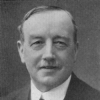Arthur Henderson

Arthur Henderson
Arthur Henderson PCwas a British iron moulder and Labour politician. He was the first Labour cabinet minister, won the Nobel Peace Prize in 1934 and, uniquely, served three separate terms as Leader of the Labour Party in three different decades. He was popular among his colleagues, who called him "Uncle Arthur" in acknowledgement of his integrity, his devotion to the cause and his imperturbability. He was a transitional figure whose policies were, at first, close to those of the Liberal...
NationalityBritish
ProfessionPolitician
Date of Birth13 September 1863
Men and women everywhere are once more asking the old question - is it peace?
On the contrary, the characteristic element of the present situation is that economic questions have finally and irrevocably invaded the domain of public life and politics.
We cannot give up hope for the future of humanity because it is our destiny to shape that future for good or ill.
Originally the League was forbidden to touch the subject of tariffs, and there was a strong predisposition to regard banking as a mystery that must be removed entirely from the purview of governments.
But the standards of statecraft insisted upon the untrammeled claim of each nation to uphold its own view of its rights by force and to build whatever armaments it considered necessary for this purpose.
When we saw a down tick in the economy, pet businesses continued to do OK, ... People were very elastic when it came to spending for their pets.
It has been said that since September, 1931, the world has been divided into wholehearted violators and halfhearted supporters of the Covenant.
But to cut off relations with an aggressor may often invite retaliation by armed action, and this would, in its turn, make necessary some form of collective self-defence by the loyal members of the League.
Moreover, war has become a thing potentially so terrible and destructive that it should have been the common aim of statesmen to put an end to it forever.
Those nations have a very great responsibility at this juncture of the world's affairs, for by throwing their joint weight into the scales of history on the right side, they may tip the balance decisively in favour of peace.
The first condition of success for the League of Nations is, therefore, a firm understanding between the British Empire and the United States of America and France and Italy that there will be no competitive building up of fleets or armies between them.
He would see civilization in danger of perishing under the oppression of a gigantic paradox: he would see multitudes of people starving in the midst of plenty, and nations preparing for war although pledged to peace.
Therefore, let us not despair, but instead, survey the position, consider carefully the action we must take, and then address ourselves to our common task in a mood of sober resolution and quiet confidence, without haste and without pause.
It has become impossible to give up the enterprise of disarmament without abandoning the whole great adventure of building up a collective peace system.